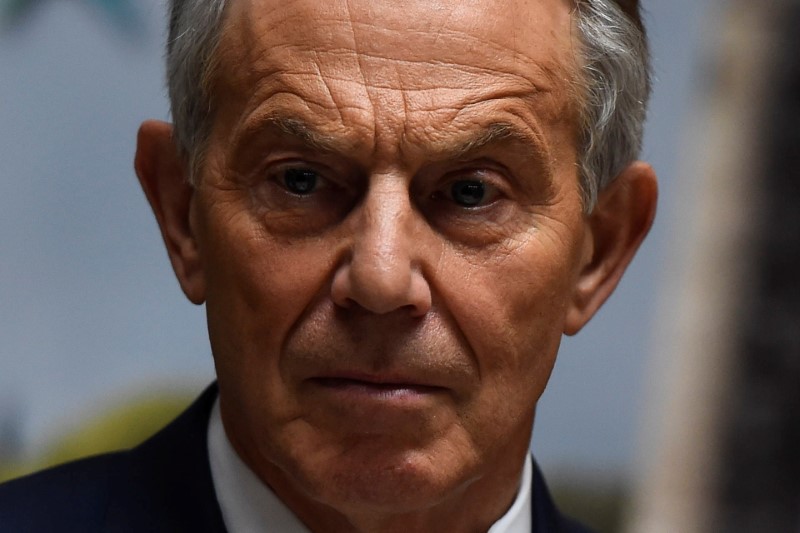By Andy Bruce
LONDON (Reuters) - European Union leaders are willing to change the bloc's rules for the freedom of movement of workers, opening an opportunity for Britain to avoid a damaging "hard Brexit", former prime minister Tony Blair said on Saturday.
The election of French President Emmanuel Macron had put reform of the EU on the table, meaning Britain and the EU could meet "halfway" to strike a deal that would keep Britain inside the world's largest trading area, Blair said.
"The European leaders, certainly from my discussions, are willing to consider changes to accommodate Britain, including around freedom of movement," the former Labour prime minister said in an article published by his Institute for Global Change.
"The opposition to free movement of people, once you break it down, is much more nuanced. The French and Germans share some of the British worries, notably around immigration, and would compromise on freedom of movement."
Blair's comments are at odds with the EU's negotiating stance, which stresses there can be no "cherry picking" from the benefits of membership of the EU's single market without accepting freedom of movement for EU workers.
In a separate interview, Blair said he thought it was possible that Britain could stay in the EU because public opinion was moving against Brexit.
"I think it's absolutely necessary that it doesn't happen because I think every day is bringing us fresh evidence that it's doing us damage economically," Blair said, in a preview of Sky News' Sophy Ridge on Sunday programme.
The pro-Brexit Leave Means Leave campaign said Blair's comments showed how out of touch he is with voters.
REOPEN THE DEBATE?
Many Western EU leaders are indeed concerned to limit free movement only to workers - as specified in the EU treaty.
Germany has won a series of EU court cases denying benefits and residence rights to immigrants who were not working.
There is little appetite in the bloc for reopening a negotiation with Britain that it already had before the Brexit referendum - partly because many in the EU see Britain's problems with EU immigration as partly of its own making.
Under Blair's government, citizens of Poland and other ex-communist states were allowed to settle immediately in Britain, despite a years-long transition period allowed under EU rules.
When former prime minister David Cameron made cutting EU immigration the focus of a deal he demanded before holding the referendum last year, other European governments argued London could do more within existing EU rules to limit arrivals.
They nonetheless agreed to a special deal for Cameron to give Britain special rights to curb EU immigration, but that deal was rendered moot by the Brexit vote.
In his article on Saturday, Blair lamented that both Prime Minister Theresa May's Conservative Party and the opposition Labour Party had set their minds on leaving the single market, without exploring the alternatives.
"Given what is at stake, and what, daily, we are discovering about the costs of Brexit, how can it be right deliberately to take off the table the option of compromise between Britain and Europe so that Britain stays within a reformed Europe?" he said.
Blair praised the current leader of the Labour Party, left-winger Jeremy Corbyn, for mobilising young voters in last month's general election in which May lost her majority in parliament.
But Britain under a Corbyn-led government could "hit the canvas, flat on our back" if it adopted hard-left economics, Blair said.
In response, Corbyn told BBC News that the economy would do well under a Labour-led government that focused on raising investment.

Blair was prime minister for 10 years until 2007. He wanted to take Britain into the euro zone and believed Britain should lead the way in the EU rather than withdraw from it.